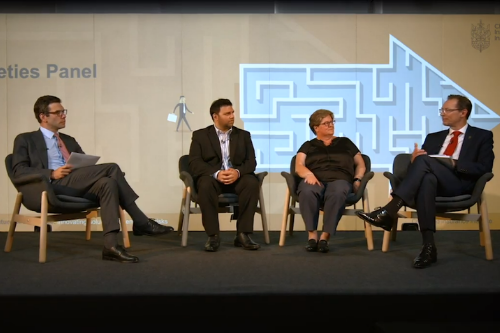

The Chartered Insurance Institute’s digital conference on ‘The Future of the Insurance Industry’ raised a host of questions on what it will take for the insurance profession to move beyond the complications of the COVID-19 crisis. The answer seems to come down to understanding the critical role that knowledge and skills play in meeting the unmet needs of customers.
During the conference’s ‘Societies Panel’, Matthew Hall (pictured far, left), strategy & operations manager, insurance societies & networks, at the CII, highlighted a few key statistics. In 2019, he noted, the World Economic Forum predicted that, by 2030, one in three of the skills currently seen as essential in business will have changed, and up to 30% of jobs could be automated or highly digitised.
“Insurance was predicted to be at the higher end of both of those estimates,” he said. “Yet balanced against that we see increased demand and insurance for what you could describe as human skills. Separate pieces of research from the CIA, as well as PwC and McKinsey, all place communication, problem solving and leadership [skills] firmly in their top five.
“On top of that, we’ve heard about the challenges posed by unmet needs. If, as individuals, organisations and society, we’re facing new or evolving risks, then surely tomorrow’s insurance professionals may need to be adaptable, flexible and responsive as well?”
With this in mind, he turned the question to the assembled panel to ask, ‘What do you see as the key skills needed by modern insurance professionals?’
Mandy Hunt (pictured centre, right), chief underwriting officer at RSA, noted that she is seeing a real mix between what has been seen in the past and what will be seen in the future. When it comes to areas such as pricing, she said, there’s no doubt that insurance businesses are going to continue to need a lot of analytical capability. Data is always going to be at the heart of that and firms are going to need a great deal of expertise in that area.
“I think the bit that’s emerging is people who can delve into customer needs and put the customer at the heart of those decisions,” she said. “At times, when you are very analytical, you focus on the outcomes, and [then] there are people that focus on customer needs - but we need to bring them together in insurance and figure out how what we are learning through the data that can help us solve some customer issues.”
Another thing that insurance professionals are going to have to embrace is the ability to communicate flexibly, as different clients will inevitably want to be addressed in different ways, Hunt said. To be able to pivot to communicate in different ways means developing the personal skills and resilience required to navigate a constantly changing external environment.
Adding to this, Jon Cawley (pictured far right), head of claims operations at NHS Resolution, noted that the insurance profession is at an exciting point with the evolution of the digital era. That brings the need for a lot of different skills, he said, including skills that were not traditionally found in the sector.
“That’s those people skills, those relationship-building skills, negotiating skills, and using that sort of pragmatic logic that comes into a bit of underwriting, [and] into claims to still apply the proposition that we want to sell,” he said, “and deliver it in a way that the customer really appreciates, and that helps us grow our businesses.”
Speaking on the unique requirements of the broking sector when it comes to developing new skills Ajay Mistry (pictured centre, left), partnerships director at Brokerbility, noted that the changing role of communication has been the biggest variation he has seen. What we do is essentially the same, he said, but how we do it is different now. The same skills as ever are necessary – businesses still need analytical people, strategic leaders and emerging talent. What has changed is that brokers now need to be considering risks that simply did not exist in the same way before COVID struck.
“So I know that one of the big drivers this year is obviously going to be cyber, and some people [are thinking] about is the next pandemic [scale] thing because so many people now rely solely on online,” Mistry said. “Those risks were a nice add-on before, for brokers, but now they’ve become a lot more centre stage within our strategy. So, I think there’s a really good opportunity for people to come to the industry now with new skills that we didn’t have before - and also for people in the sector to start thinking wider and developing their roles.”
